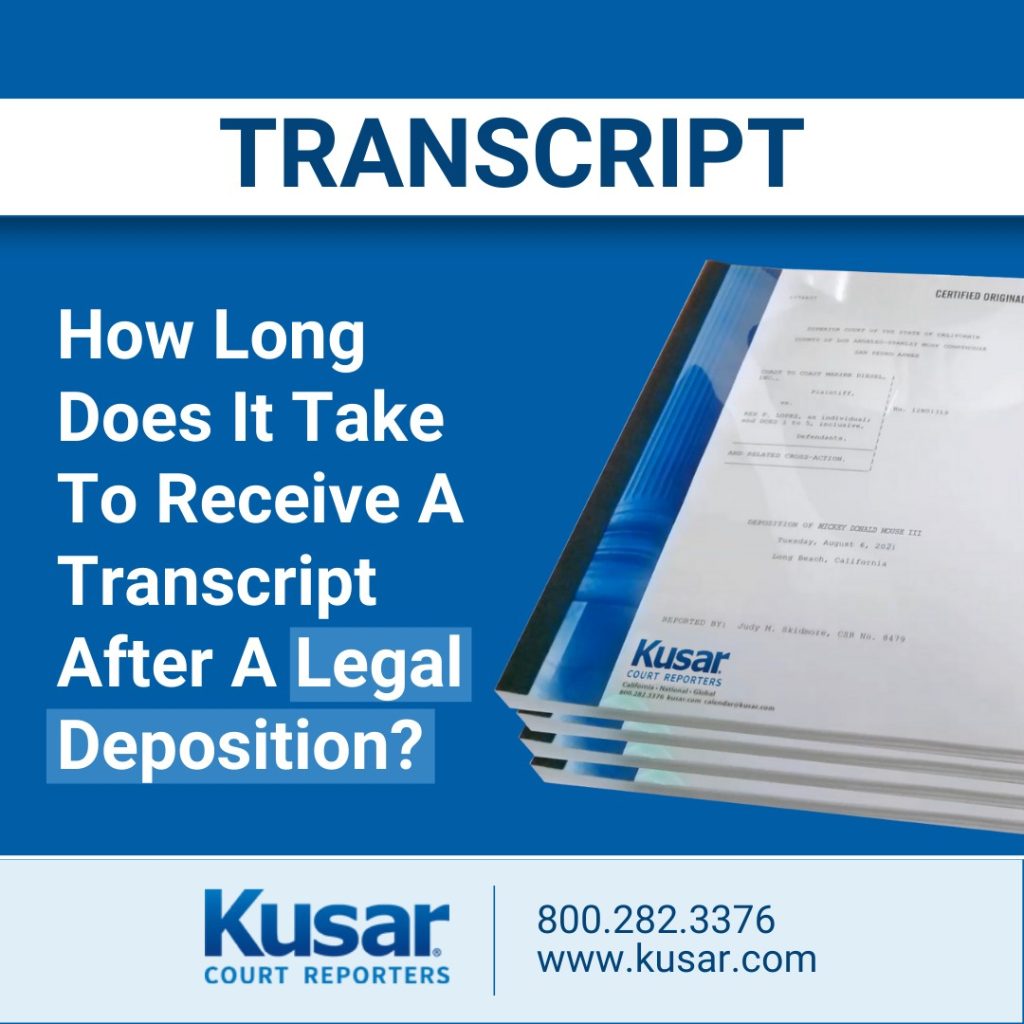
How Long Does It Take To Receive A Transcript After A Legal Deposition?
Lawyers and other professionals rely on court reporters to transcribe testimony from legal proceedings. These professionals specialize in taking testimony from a deposition or hearing to create a transcript. Since most cases are on a deadline, it is crucial to know when you will receive a legal deposition transcript. Find out when you can expect to receive this vital component of your legal proceedings. If you require legal court reporting services for your law firm, consider scheduling with Kusar Court Reporters by calling 800-282-3376.
What Is a Legal Transcript?
A legal transcript is a type of text document. A court reporter will capture the words from a legal proceeding such as a deposition or hearing. A professional court reporter prepares transcripts that are an invaluable resource for many cases. With a transcript, attorneys can quickly access, in a readable format, all the testimony from interviews, depositions, interrogations, official court hearings, client letters, and other documents related to a case.
When Should You Expect To Receive a Finished Legal Transcript?
In some cases, a rough draft of a legal transcript may be ready within hours after the proceedings giving the reporter time to insert proper names, etc., but usually within 24 hours. The average time it takes a court reporter to finish a deposition transcript for normal delivery is around 10 working days. Court reporters have a strict deadline to complete and deliver transcripts in a timely manner but can always accommodate rush or expedite delivery requests. Accuracy is essential to these documents, and it could take longer, depending on the length of the deposition. Times can vary depending on the agency. However, some court reporters are known for their fast turn-around time.
Why Does It Take So Long To Complete a Transcript?
Focusing on the transcription process can help attorneys understand the challenges of creating a timely transcript. Once a deposition is concluded, the court reporter still has plenty to do. This professional will read through the entire proceeding to ensure accuracy and insert proper punctuation. The court reporter also compares any shorthand notes to the translation to make an accurate transcription. She/he will also research many sources, including legal documents and the internet, to ensure that a transcript is as accurate as possible. For example, if the name of a person or organization is not immediately evident from any exhibits, the court reporter may contact the legal assistants involved in the case for specific spellings of these names. After editing, a court reporter reads the transcript carefully to proofread for spelling or typographical errors. Reporters often proofread transcripts a second time if the testimony involves complicated scientific, medical, or technical terms.
The production phase is done by the court reporting agency. At this point, the file will be processed through several computer programs to make it available electronically in several formats. Exhibits are scanned and linked electronically to the transcript, so they are available to all parties. Additionally, upon request, they are printed and sent as a hard copy to the attorney. In California, the original transcript must be produced in hard copy format. After the transcript and exhibits have been uploaded, they can be accessed by the attorney and legal assistant. Also, they are delivered electronically to the ordering parties. Creating an official transcript is time-consuming, and in some instances, the court reporter will need to make special arrangements for rush or expedited delivery requests.
How To Ensure the Timely Delivery of a Transcript
An attorney and/or legal team should provide all of the necessary exhibits, documents, and other data to the court reporter. Without that information, it can be difficult to transcribe the legal deposition.
When scheduling a deposition, inform your court reporter of any specific date or expedited turn-around time requirements. If there are any questions regarding the expected delivery date of the transcript, make sure to discuss the matter with the court reporter. Always contact your court reporter to inquire if there is no transcript delivered within two weeks.
Can the Court Reporter Expedite the Transcript?
Court reporters understand the importance of providing speedy transcripts for those who require them. If they know the attorneys need a transcript by a specific date, every effort will be made to meet those requests. When court reporters are asked to produce transcripts quickly, they often have to work overnight and into the next day. It takes two to three hours to finalize a transcript for every hour of a witness’ testimony. Working with an agency beforehand may be able to help deliver an accurate transcript at a faster-than-expected wait time.
Choose an Experienced Court Reporting Agency for Your Proceedings
Delivering an accurate legal deposition transcript is important for any case. Working with the right agency may help you receive these transcriptions in a timely manner. The professionals at Kusar Court Reporters are here to assist you.

